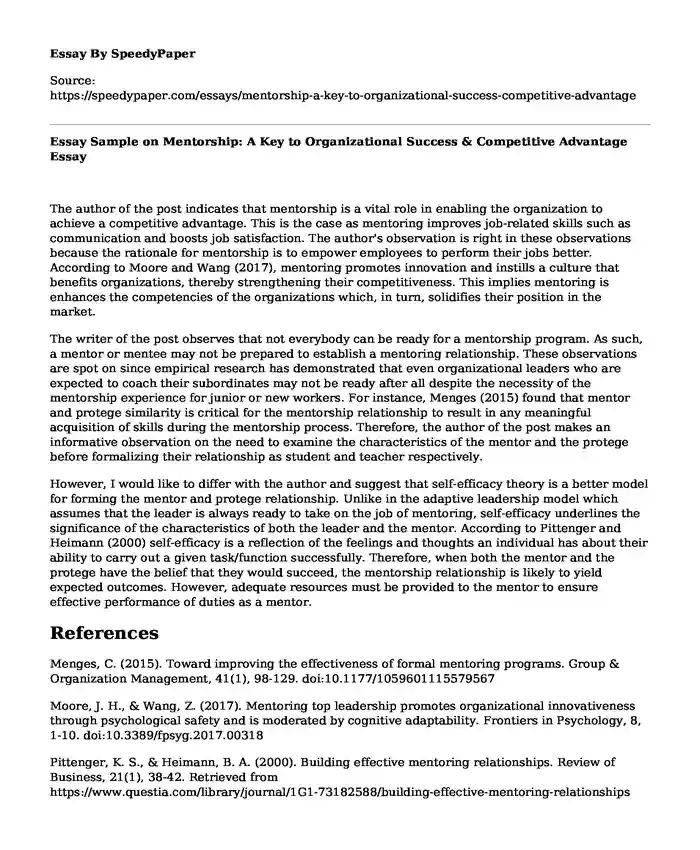
| Type of paper: | Essay |
| Categories: | Teaching Leadership analysis Learning Human resources Relationship Interpersonal communication |
| Pages: | 2 |
| Wordcount: | 426 words |
The author of the post indicates that mentorship is a vital role in enabling the organization to achieve a competitive advantage. This is the case as mentoring improves job-related skills such as communication and boosts job satisfaction. The author's observation is right in these observations because the rationale for mentorship is to empower employees to perform their jobs better. According to Moore and Wang (2017), mentoring promotes innovation and instills a culture that benefits organizations, thereby strengthening their competitiveness. This implies mentoring is enhances the competencies of the organizations which, in turn, solidifies their position in the market.
The writer of the post observes that not everybody can be ready for a mentorship program. As such, a mentor or mentee may not be prepared to establish a mentoring relationship. These observations are spot on since empirical research has demonstrated that even organizational leaders who are expected to coach their subordinates may not be ready after all despite the necessity of the mentorship experience for junior or new workers. For instance, Menges (2015) found that mentor and protege similarity is critical for the mentorship relationship to result in any meaningful acquisition of skills during the mentorship process. Therefore, the author of the post makes an informative observation on the need to examine the characteristics of the mentor and the protege before formalizing their relationship as student and teacher respectively.
However, I would like to differ with the author and suggest that self-efficacy theory is a better model for forming the mentor and protege relationship. Unlike in the adaptive leadership model which assumes that the leader is always ready to take on the job of mentoring, self-efficacy underlines the significance of the characteristics of both the leader and the mentor. According to Pittenger and Heimann (2000) self-efficacy is a reflection of the feelings and thoughts an individual has about their ability to carry out a given task/function successfully. Therefore, when both the mentor and the protege have the belief that they would succeed, the mentorship relationship is likely to yield expected outcomes. However, adequate resources must be provided to the mentor to ensure effective performance of duties as a mentor.
References
Menges, C. (2015). Toward improving the effectiveness of formal mentoring programs. Group & Organization Management, 41(1), 98-129. doi:10.1177/1059601115579567
Moore, J. H., & Wang, Z. (2017). Mentoring top leadership promotes organizational innovativeness through psychological safety and is moderated by cognitive adaptability. Frontiers in Psychology, 8, 1-10. doi:10.3389/fpsyg.2017.00318
Pittenger, K. S., & Heimann, B. A. (2000). Building effective mentoring relationships. Review of Business, 21(1), 38-42. Retrieved from https://www.questia.com/library/journal/1G1-73182588/building-effective-mentoring-relationships
Cite this page
Essay Sample on Mentorship: A Key to Organizational Success & Competitive Advantage. (2022, Dec 27). Retrieved from https://speedypaper.net/essays/mentorship-a-key-to-organizational-success-competitive-advantage
Request Removal
If you are the original author of this essay and no longer wish to have it published on the SpeedyPaper website, please click below to request its removal:
- Research Paper Example about Bullying
- Group Therapy Essay Sample
- World Affairs: Importance of Mabo Decision, Law Essay Sample
- Garden Coordinator CV and Cover Letter, Free Example for You
- The New Pay Plan Essay Sample
- Free Essay Discussing Communication Barriers in Business Management
- Essay Sample on Foreign Policy Analysis, Egypt's Grand Strategy
Popular categories




